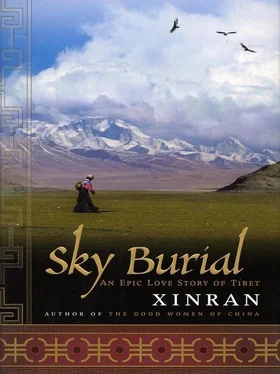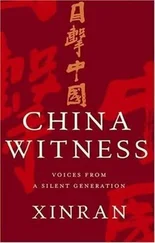Feeling that she’d regained a lot of her strength, Wen got down from the communal plank bed to discover that the new uniform she was wearing had been crushed into a mass of creases and wrinkles. If Kejun could have seen her, he would have given her a tap on the nose-the punishment he had meted out whenever Wen hadn’t been able to answer one of his questions. She had loved this “punishment” of hers. One touch of Kejun’s hand would suffuse her entire body with warmth. Often, she used to fudge her answers on purpose.
“Sleep well?” A man greeted her with a smile from the doorway, interrupting her thoughts. Wen could sense immediately from his bearing, and from the firm and direct way in which he had addressed her, that he was an official.
“I-I slept very well. Thank you,” she answered nervously.
The man introduced himself as Wang Liang and invited her to come and have breakfast.
“I can hear your stomach grumbling,” he remarked. “The soldier who brought you here said you didn’t come out of your room after your wash. Later on, a female comrade reported you were fast asleep, so we didn’t wake you for dinner. In times of war, a good night’s sleep is too precious to disturb.”
Wen warmed immediately to Wang Liang.
She ate her first northern-style breakfast: a bowl of hulatang-a glutinous soup made from wheat flour mixed with coarsely chopped pickled greens, pig’s offal, and lots of chili powder; there was also a cake of maize flour, very harsh to the mouth, and a lump of a very salty pickle made from mustard leaves, which they call “geda.” These crude, spicy flavors would normally have been bitter medicine to a southern girl weaned on more refined substances, but Wen’s stomach seemed already to have been disciplined by her military uniform and by hunger, and within minutes, she’d eaten her way through the helping of breakfast doled out to her, and knew she could easily polish off another two. But when Wang Liang asked if she wanted some more, Wen refused. Having read reports about the strict rationing still in force in the army, she knew that an extra helping for her would be snatched from the mouths of others.
After breakfast, Wen walked with Wang Liang to his office. Photographs of Mao Tse-tung and Zhu De in military uniform hung on the walls, giving the makeshift room an air of deep solemnity. The presence of a table and three chairs indicated that the office’s owner had the authority to hold meetings. On the walls of the room were painted the Three Great Regulations and the Eight Principles of the Liberation Army in bright red characters. Wen was already familiar with these army slogans, among them “Obey all orders,” “Do not take as much as a needle or a piece of thread from the masses,” “Don’t damage crops,” and “Don’t mistreat captives.”
Seated at his desk under the portraits of the great leaders, Wang Liang seemed serious and imposing. With great firmness, he tried to persuade Wen to change her mind about going to search for Kejun. He urged her to put aside her feelings for her husband, and to consider the difficulties and the dangers she would face if she traveled to Tibet: she couldn’t speak the language, she could easily lose her unit, the terrain and the altitude were making people ill, and the situation out there was extremely unpredictable. The casualty rates were high and, as a woman with no training, the chances of her surviving even a month were extremely low.
Wen looked Wang Liang in the eye. “When I married Kejun,” she said, “I pledged my life to him.”
Wang Liang bit his lower lip. He could see that Wen was not going to give up.
“You have a very stubborn heart,” he said. “There is a military train going to Chengdu tomorrow. You may board it.”
He handed her a booklet of military information on Tibet and Tibetan customs. Wen accepted them gratefully.
“Thank you, sir. I will study these hard during the journey and try to adapt to the conditions there.”
“War gives you no time to study and no chance to adapt,” Wang Liang remarked grimly as he got up and walked around to Wen. “It draws clear lines of love and hate between people. I’ve never understood how doctors manage to choose between professional duty and military orders. Whatever happens, remember one thing: just staying alive is a victory.”
Wen sensed Wang Liang was trying to frighten her. She nodded to show respect, but didn’t understand what he had meant. She gave her sister’s silk bag to Wang Liang: inside she had written the names of Kejun, her parents, her sister, and herself. She told Wang Liang that she hoped everyone inside the bag would be reunited in Suzhou. In return, Wang Liang gave Wen a pen and a diary. “Writing can be a source of strength,” he said. Wen had spent less than an hour in Wang Liang’s company, but his words were to remain with her throughout her life.
THE SO-CALLED army transport train turned out to be no more than a glorified goods train: each railroad car holding almost a hundred impossibly cramped people. The tiny windows, only twenty centimeters square, let in very little light. Wen, along with the only other female passenger, a nurse, was forced to huddle with the men. Before they got on the train, someone introduced the nurse to her: she was from Wenzhou and was eager to talk, but no one in the car, not even Wen, could understand what she was saying because of her thick Zhejiang accent. About once every four hours, the train would stop for five minutes in some desolate wilderness to give people a chance to empty their bladders and shake their arms and legs a bit. Sometimes, at night, it halted near a military supply station and they were given a proper meal, but otherwise, during the day the soldiers staved off their hunger pangs with biscuits and dry steamed buns.
To begin with, some of the soldiers were excited by the scenery whizzing past the tiny windows, but soon the lack of oxygen and the stifling heat inside the closed car sucked all the life out of them. Their only source of entertainment consisted in trying to get the Wenzhou nurse to produce her meaningless sounds. After a few hours of this, even she stopped talking.
Wen wasn’t in the mood for conversation. Her thoughts were entirely caught up with her search for Kejun. She couldn’t even face introducing herself to her fellow soldiers, terrified that the most basic question might send her into a state of emotional turmoil. She concentrated instead on reading the booklet Wang Liang had given her.
It spoke of nomadic tribes and the importance of religion in Tibetan culture. It was difficult to take in so much information and Wen’s tired eyes kept closing.
FOR TWO days and two nights, the train rocked its silent passengers along their journey. It was early morning when it pulled into the large city of Chengdu. Wen was relieved to have arrived, for here she would find the recently built road that joined China to Tibet for the last leg of her journey. She was eager to see the road. She remembered the news reports when it had opened in 1954, proclaiming what an extraordinary feat of engineering it was. Joining Chengdu with Lhasa, a distance of nearly 2,500 kilometers, it was the longest road in China and the first proper road in Tibet. The four years it had taken to construct the road seemed short considering the number of mountains it had to cross, fourteen in all, and the rivers too, at least ten. The terrible snows and freezing winds that the laborers had had to bear were legendary.
ALTHOUGH AUTUMN was fast approaching, Chengdu was still enveloped in the humid, stifling heat of summer. Getting down from the train, Wen wiped her face with the sleeve of her sweat-soaked uniform. She could not imagine how shamefully dirty her face must be. It felt sore-rubbed raw by the continual wiping away of sweat during the journey. A huge number of soldiers were crowded on the platform, but the station was oddly hushed. The sardine-can conditions and lack of oxygen had exhausted everyone. Wen searched along the neat line of army placards on the platform, looking for the unit number she needed.
Читать дальше












